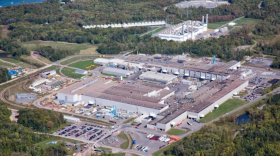For the first time since the 1970s, New York state will issue permits for new liquefied natural gas storage facilities. The new regulations will require a permit for every new facility, with each one capped at 70,000 gallons.
That’s enough to fill six or seven fuel tankers, says Russ Haven of the New York Public Interest Research Group. Haven says capping them at a small size is a good way to keep out heavy industrialization, but the limit can be removed after five years.
“And so that’s really a flag to us that what appears to be a way to ensure the public safety may be removed at any point,” says Haven.
Public safety concerns led to the ban in the first place. It was enacted after an 1973 explosion at an LNG storage facility in Staten Island killed 40 people. The new regulations include a requirement that new facilities have to comply with National Fire Protection Association guidelines.








